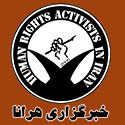(۳۱ July 2008) The International Campaign for Human Rights in Iran has sent an open letter to the Head of Iran’s Judiciary , Ayatollah Mahmoud Hashemi Shahroudi, enumerating grave legal flaws in the trial of convicted Kurdish teacher Farzad Kamangar, and appealing for a commutation of his death sentence and an investigation “to ensure justice and protect the integrity of the Judiciary itself.”
Kamangar, whose February 2008 death sentence on charges of Mohareb, or taking up arms against the State, is considered a prisoner of conscience by the Campaign. His sentence has been confirmed by the Supreme Court and he may be executed at any time.
In the letter, the Campaign detailed that Kamangar had been held incommunicado for much of his imprisonment; that he had been denied access to his lawyer before, during and after the trial, and denied information about the charges against him; and that Kamangar had been tortured in detention. Kamangar is accused of membership in the armed group P.K.K., which is a Kurdish group fighting against the government of Turkey.
Kamangar’s trial lasted only seven minutes, during which neither he nor his lawyer was allowed to speak, and Kamangar thus had no opportunity to defend himself. According to his lawyer, no evidence whatsoever was produced to support the charges against him.
According to the Campaign, “It appears that the result of this trial was prepared in advance and that the trial was staged in order to give the appearance of a proper legal process leading to this result… the procedure and trial regrettably suggest political motivations on the part of his accusers, and failure or unwillingness by the courts independently to assess guilt or innocence.”
The Campaign urged Ayatollah Shahroudi to immediately act in suspending Kamangar’s sentence and ordering a fair and independent investigation, “both to ensure justice in this case and to protect the integrity of the Judiciary itself.”
The text of the letter may be found at http://www.iranhumanrights.org/main/library.html#c339
Blog post
Article from your blog



